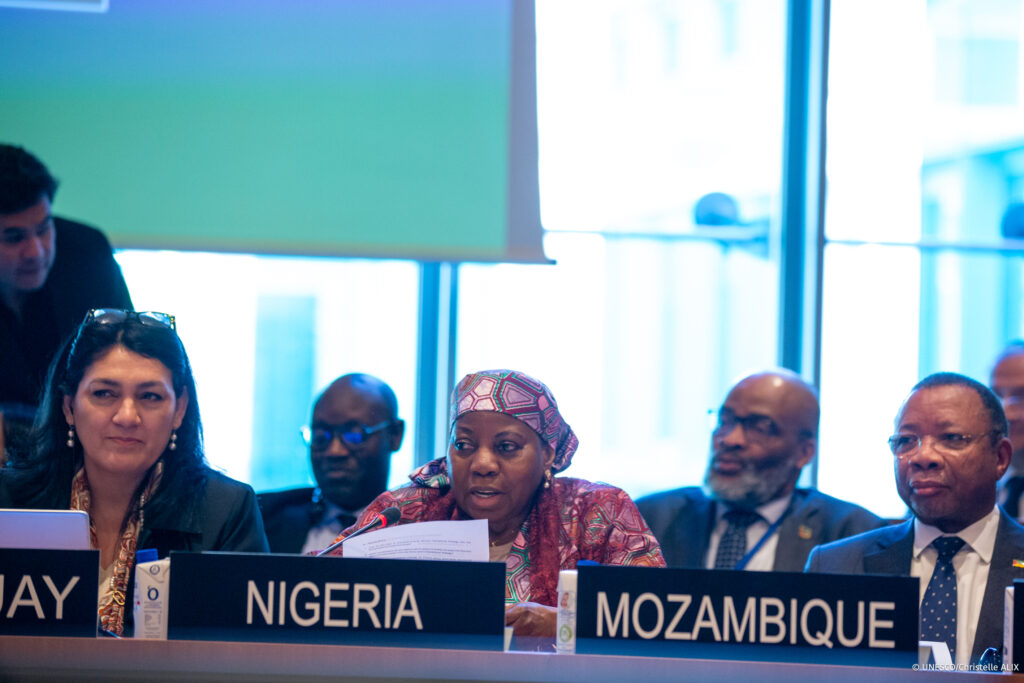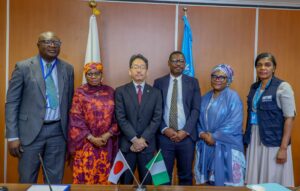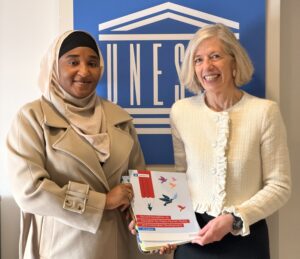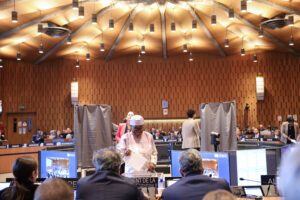
NIGERIA’S NATIONAL STATEMENT DELIVERED BY H.E. DR. HAJO SANI, AMBASSADOR, PERMANENT DELEGATE OF NIGERIA TO UNESCO, AT THE PLENARY DEBATE OF THE 221ST SESSION OF THE EXECUTIVE BOARD, 7TH APRIL 2025
Madam President of the General Conference,
Chairperson of the Executive Board,
Director-General,
Excellencies,
Distinguished colleagues,
In the name of Government and the people of the Federal Republic of Nigeria, I am once again pleased to address this plenary session.
The 221st Session of the Board is unique, given the array of items on the agenda before us – one of these being the Draft 43 C/5, which we started to consider at the last Session. Nigeria is glad to see improvements on the updated document by the Secretariat, based on our earlier inputs. We stand ready to continue the consultation as we proceed from here.
It is no gainsay that there are challenges Ahead. But Nigeria remains optimistic, and we look forward to joining in the deliberation towards finding the best budget scenario that will ensure there is less negative impact on programme execution in the next biennium.
We note the improvement in multisectoral programming and enhancing delivery as one. And urge that the aspirations are matched with consistency of action by all and sundry. In the same vein, Nigeria welcomes the decentralizing of resources, whereby 27% of regional funding is allocated to Africa. This financial commitment underscores our strategic focus in ensuring that Africa remains at the centre of our global development agenda. We also note the fact that UNESCO is enhancing its communication presence in the region, strengthening reporting on program implementation, and ensuring visibility through both traditional media and digital channels.
In today’s complex development landscape, Nigeria reiterates its belief in UNESCO’s multidisciplinary mandate as a partner in progress, both for our regional and national priorities. We shall continue in this spirit, while we offer home expertise through the various channels of programmes, normative instruments, conventions and recommendations, the Intergovernmental Committees, as well as the Governing Bodies.
On national priorities, we are pleased by the advancement in the process to establish an International Media and Information Literacy Institute, as a UNESCO Category 2 Centre in Abuja. The favourable report of the feasibility study affirms our readiness, while we work with the Secretariat for final approval by the 43rd General Conference. Nigeria appreciates all Member States who have been supportive. We seek their continued cooperation as we move to strengthen the membership of the Governing Board of the Institute, to further its international status.
Government is complementing its drive in the education sector through an initiative on “Transforming Education Systems at State Level (TESS) program. Initiated in response to the need for educational reform and improvement, TESS aims to enhance the quality of education and learning outcomes in Nigerian states by addressing some key challenges in the education sector, namely: Improving teacher quality; Enhancing curriculum and learning assessment systems; Strengthening school infrastructure; and Promoting community engagement.
Likewise, the Adolescent Girls Initiative for Learning and Empowerment, (AGILE) Project, a World Bank assisted project of the Federal Ministry of Education geared at improving secondary education opportunities for adolescent girls aged between 10 and 20, in terms of access and completion. The AGILE Project consists of three main components, namely: Creating Safe and Accessible Learning Spaces; Fostering an Enabling Environment for Girls; and Project Management and System Strengthening. While the plan is to expand, the current implementation states from the current seven.
We are also delighted that the Federal Government has formally admitted the Nigeria National Committee for the UNESCO International Geoscience and Geoparks Programme into the National Council on Hydrocarbons, marking a significant step toward mainstreaming the UN policy and advocacy frameworks on sustainable earth resource management in the country’s petroleum industry. This aligns with UNESCO’s commitment to balancing resource extraction with geoheritage conservation to facilitate the development of UNESCO Global Geoparks in Nigeria.
Madam, Chair,
Over the past two decades, Nigeria has been at the forefront of implementing the principles of the UNESCO 2005 Convention, leveraging its vibrant cultural industries, including music, film, literature, and arts. We are happy to contribute to the anniversary of the Convention through an array of programmes by the Institute for African Culture and International Understanding, a UNESCO Category 2 centre in Abeokuta. One of such is the launch of the book titled Cultural Odyssey: 20 Years of Implementation of UNESCO’s 2005 Convention in Nigeria. The book offers a comprehensive overview of Nigeria’s progress in implementing the Convention, its impact on the cultural landscape, and a reflection on the lessons learned throughout the two decades. Other events lined up for the year-long celebration include vibrant carnivals; national exhibitions highlighting the creative industries, art exhibitions featuring works that celebrate cultural diversity, and many more.
Turning back to this Session’s agenda, we recall the collaborative efforts between the Secretariat and Member States, in the implementation of the Operational Strategy for Priority Africa and its five Flagships in the report of programme execution during 2024. Nigeria welcomes the impetus to the implementation by the activities of the Group of Friends, the constitution of Small Action Groups and renewed engagements across regions, as steps in the right direction. We also note the progress in Priority Gender, Youth and the Small Island Developing States (SIDS).
Let me close by recalling our shared responsibility as Member State and the Secretariat, to continue to believe in the integrity of UNESCO to deliver on its mandate. Nigeria calls for advancement in integrated, coherent and multidisciplinary action, where UNESCO enjoys comparative advantage over other UN specialized agencies. By this we shall leverage on the good things that unite us, while improving on aspects where we have differences of viewpoints.
I thank you for your attention.




